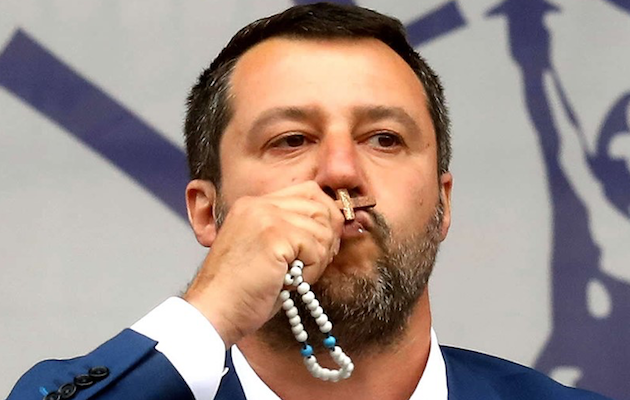The Italian politician’s worldview precludes the teachings of the good Samaritan, despising it as naïve do-goodism.
 Matteo Salvini kisses a rosary at a rally in Milan, May 2019. / Facebook Matteo Salvini
Matteo Salvini kisses a rosary at a rally in Milan, May 2019. / Facebook Matteo Salvini
“We are good Christian, but we are not dumb”, said the then still Italian Interior Minister and Vice-president Matteo Salvini in August as he responded to the Proactiva Open Arms rescue boat’s request to dock at Lampedusa. The boat, carrying 160 people rescued out in high seas, had been 19 days close to the island, waiting for a political decision to let it dock.
Salvini’s statement is the tip of the iceberg of his understanding of Christianity. An understanding that evokes the medieval power relations between the Vatican and European kings. In those, identity and the definition of faith changed according to political stances, by dint of encyclicals, leading to intolerance against those considered to be enemies and to the beatification of supporters.
See, for example, his recent speech in Piazza del Duomo, Milan, on May 18, when the leader of Lega Nord publicly kissed a rosary - which, by the way, he claims to use against immigration - while criticizing Pope Francis’ statements in favor of welcoming refugees. Immediately afterwards he projected pictures of Pope John Paul II and Pope Benedict XVI on giant screens, yearning for their papacies.
This is the classic idea that says God cannot cope with all aspects of human reality, e.g. the government. This is an irresponsible twisting of Jesus’ words in Matthew 22:21, believing that the things that are Caesar’s can’t be dealt with by God. In fact, in the version of Christianity according to Matteo Salvini, Caesar could be a completely independent entity, working without any accountability and having total control over the elements he’s been given to rule upon. God already has the environment as his domain.
With this statement, Salvini is saying that the “good” Christian must act strategically in front of any circumstance, measuring their degree of commitment and dedication as to avoid giving more than what’s strictly necessary. Even making cuts in the needs, if possible, to avoid taking part in such sacrificial situations. But nothing could be further from Christ’s example. Nothing could be more distorted, away from the raison d’être of the good news of the Gospel.
The parable of the Good Samaritan could never fit in the Italian politician’s understanding of Christianity; that story teaches (among other things) not to make calculations about the consequences of deeds done from love, but to perform them with no strings attached, learning from the greatest example of free-giving, i.e. grace, from the Master. As is the case with the taxes for Caesar, hierarchy and public recognition become essential to the priest and the Levite, going beyond God’s original design for human relationships. However, the parable is clear in its conclusion: they do not represent God’s character.
This is why Salvini errs in presenting his immigration policies and decisions as based on the “right” Christianity. He fails at drawing a line between his own interests, or the imposition of his worldview and his sociopolitical structures, and God’s established way of dealing with people in need. Those aboard the Open Arms boat, without need for going into their origins and personal stories, fulfilled this requirement under those circumstances.
The political frustration of the former Italian Interior Minister was understandable to a certain degree. He knowingly made some promises that transcended him and the functions bestowed upon him by virtue of his position. Nevertheless, his discourse won’t help him achieve his goals. Presenting the issue of refugees from the precondition that all ports must be closed to refugees won’t make a great impression on the EU institutions. The only viable path for a coastal nation like Italy facing massive migrations that won’t stop is pressuring the rest of EU nations, through dialogue, so they will honor their commitments towards refugees, and putting pressure on Brussels in order to draw up new guidelines regarding migratory movements. There is a need for this.
Actually, it is necessary to renew the welcoming character of our continent, which now is losing its identity and values that have defined its historical concern over human rights. Statements like those by Salvini and his understanding of the “right” Christianity and dumb Christianity represent yet another attack against that identity and values, twisting the message of peace and welcoming into a fatal expression of blocking and dehumanization. And that is not Christianity.

Las opiniones vertidas por nuestros colaboradores se realizan a nivel personal, pudiendo coincidir o no con la postura de la dirección de Protestante Digital.
Si quieres comentar o